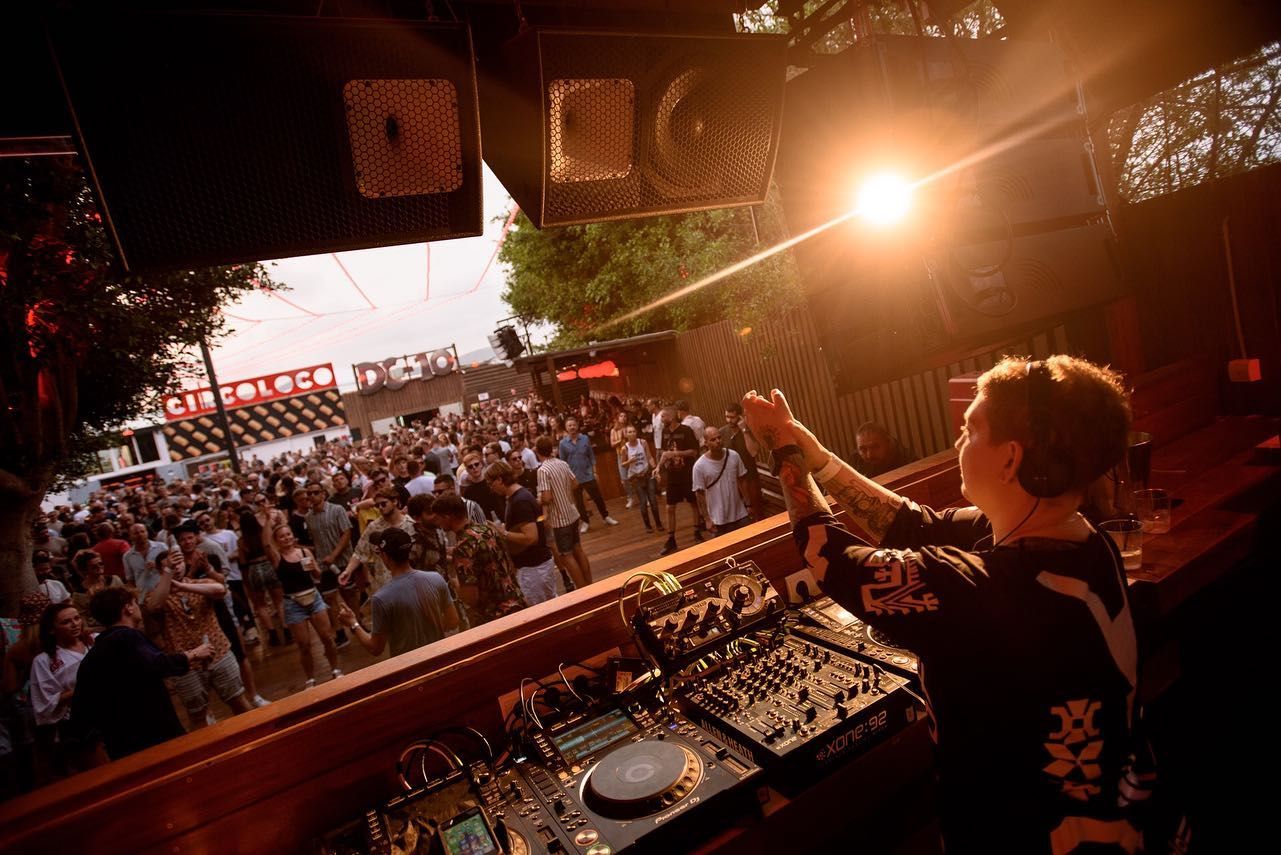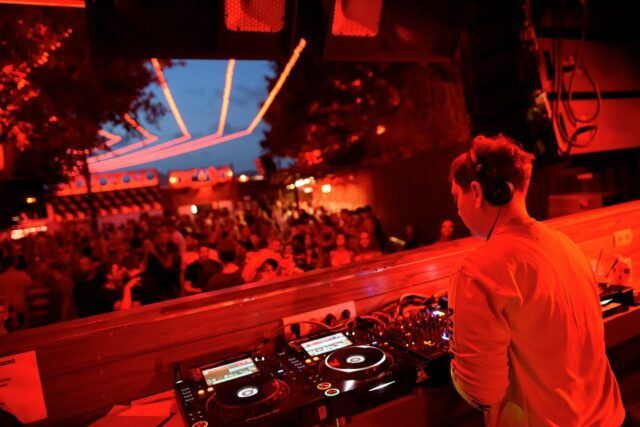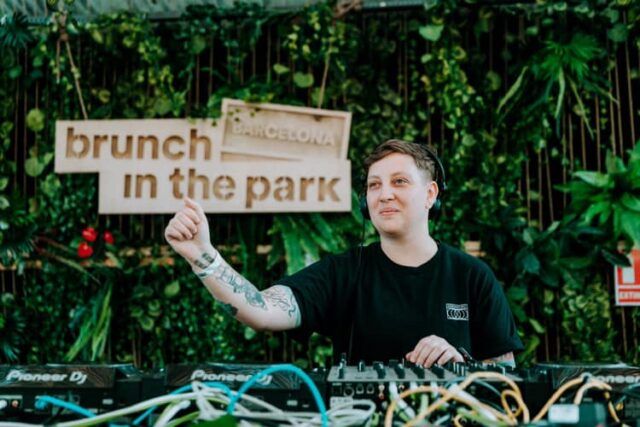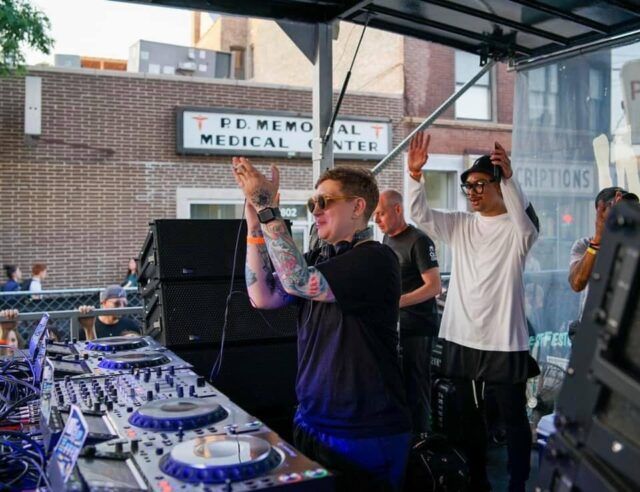Alinka Ratner’s story will be a familiar one to most DJs: she fell in love with house music and DJ culture as a teenager, bought decks and taught herself to mix. She eventually got a warm-up DJ role for Justin Long’s .dotbleep party at Chicago’s Smart Bar which she held down for nearly a decade. In 2012 with Shaun J. Wright (former Hercules & Love Affair vocalist) she launched the Twirl parties and label. Together and individually, Alinka has since gone on to release on Classic Music Company, Crosstown Rebels and Rekids, as well as remixing artists like the Oracle, The Juan Maclean, Adam Port and Spencer Parker. Her music, whether DJing or producing, is always 4/4, and ranges across “House, Italo, Electro, and a little techno.”
Who Is Alinka? Berlin-based Alinka arrived in Chicago from Ukraine in the late 80s. She is a party promoter, producer and house DJ who pre-pandemic was regularly DJing at venues like Circoloco, Panorama Bar and Shelter.
We sat down with Alinka to get the nitty-gritty details of her DJing.
Put this set on and dive in.
Tell us a bit about your DJing. What format/kit do you usually use? What style do you play?
These days I mostly play on CDJs, but bring vinyl along sometimes as well. I started on vinyl in 2000. I later switched to vinyl with Serato, and then moved on to CDJs around 2013. I usually like to switch between genres. I mostly play House, Italo, Electro, and a little techno. I try not to limit myself in any way; if I like a track, I’ll play it.
You play on both digital and vinyl – do you have a preference? From a DJing point of view, what are the advantages and disadvantages of each format?
I think they’re quite different for me. I love the ease of traveling with USB sticks and playing on CDJs, and the extras that allow you to get really creative with looping. It’s also really helped open me up creatively having access to so much music where I can switch genres and moods quickly and am not limited to what’s in my record bag. However, I miss the simplicity and the fun of mixing vinyl that you don’t really get with digital. In many cases, it’s really nice to just show up with your record bag and only have those options to create a vibe and find cool B sides and all the joys of playing vinyl. With records, you really use your ears more and it’s more organic and you somehow feel it more. There’s an irreplaceable feeling when you’re mixing vinyl, it’s just super fun.
In terms of equipment, what do you bring with you to gigs?
I bring a case of USB sticks – I usually have 2 copies of the most current one just in case. Plus headphones, and sometimes a few records depending on where I’m playing.

What’s the worst technical hitch you’ve ever had DJing, and how did you deal with it?
I’ve had lots of emergency loop situations with CDJs, which is never fun. I usually just improvise and try to quick-mix a track in on the other CDJ as fast as possible, as to not disturb the vibe.
What’s the one piece of advice you’d give to a new DJ?
Practice, practice, practice. Take your time and learn the technical part of DJing, no matter what format you have access to.
Learn from the people that came before you and watch other DJs you admire. I used to stand in the back of the booth in Chicago to watch my favourite DJs and how the crowd reacted to certain tracks, and then I would go home and practice. This was very helpful for me.
Take your time, don’t take shortcuts, don’t give up.
In your opinion, what is it that makes a record work on the dancefloor?
For me personally, I’m a party DJ. I’m not a snob with music – my goal is always to create a vibe and special moments people will remember. I really only play music I would want to dance to, and music that makes me feel something. If a record doesn’t give me goosebumps or move me in some way, I don’t play it on a dancefloor. There’s a lot of music I like and will put in mixes that I wouldn’t play at a club. I think on a dancefloor, it has to really move people and have a special energy.
The subject of DJs using FX is often divisive. How do you feel about DJs using FX in their sets? Do you have any little FX tricks that you could share with us?
I like FX in sets in moderation. When I started, I was playing mostly on a Pioneer 600 mixer at home – it had those little metal levers to change between line and phono, and you could do little tricks with moving the levers with the Echo effect on and get creative.
Now obviously everything is updated and there are many more options. I don’t really use them in my sets unless I’m playing on a Pioneer mixer, in which case I’ll mostly use the delay/echo effects. If it can enhance the mix or the feeling in the room then I’m all for it, but I think it’s more special if only done once in a while. You don’t want to hear someone using FX on every mix; it would get very annoying very quickly and distract from the music.

Regarding EQ and filters then, tell us a bit about the role they play in your DJing style:
I watched my favourite DJs in Chicago use the EQ extensively, oftentimes also to create different effects and mood changes in the room. For me, the EQ is the most important part of getting a clean blend, and also to create unexpected changes in tracks. I like to do this with the EQ more so than FX. There’s also something magical with the effect of subtraction – cutting the bass or highs and bringing them back in to make people miss them and go crazy. You can get quite creative with it.
Do you do much live looping or re-editing? Any tips for using loops while DJing?
I do a lot of looping in my sets; I love it. I like to do it on the fly, as it feels more natural for me; I don’t set up loops in advance in Rekordbox. Looping is really a big advantage for me when it comes to playing digital, especially because I switch genres quite a bit in my sets. A lot of tracks I play have weird and quick intro/outro situations, so you need to oftentimes find a loop and re-edit them live. I love the feeling of improvisation and creating something unexpected on the fly. That’s what I loved about mixing vinyl because it was different every time, and live looping somehow re-creates that feeling for me.
Do you change your DJing style depending on the size of the room?
I don’t change my style depending on the size of the room, but I definitely change it depending on the place I’m playing or the crowd. I usually like to go to the venue and see the DJ before me and get a sense of the crowd and then base it on that. I came up and learned to DJ from being an opening resident, while also doing peak time sets in between, so I’m quite lucky to have that education. For me, it’s not the size of the room but the time/atmosphere/crowd that makes me select the music.

Obviously, a vital aspect of DJing is crate-digging, either in the real world or virtually. How do you source your music?
These days I mostly shop for music online and spend hours going through promos every week. I have the labels and artists I follow on Beatport and usually go through the new releases weekly and put stuff in different carts. I also check record shops online and listen to stuff that way. It’s become a bit daunting with digital music to go through all the new releases because so much music comes out these days, and it’s really hard to find the right tracks so I try to simplify it as much as possible. I also check artist charts of DJs I like. If I find an artist or label I like, I will usually go through their whole catalogue and find other labels and artists that way as well.
Do you use Rekordbox? If so, do you compile playlists?
I do use Rekordbox, only to compile playlists. I am trying to get more organised with my playlists – it was definitely a learning experience for me throughout the years. Going from vinyl where I knew my music by the artwork to having to remember names of tracks or labels or artists was quite difficult. Now, I try to be very specific with my playlists. I have folders for different genres, gigs/venues also, then split into genres, promos by genre, and then everything by date.
How do you keep track of music in your collection? How do you find a particular record in your collection? Are your records in order?
Most of my records are sadly still in the US with my father, as I couldn’t afford to bring them when I moved to Berlin – so I only have a small collection here. But in Chicago, I organised them by label and region. If it was a label I collected extensively like Cajual or Classic, they had their own sections. Then I had a West Coast section, a UK section, techno section – and then Chicago, Detroit, and NY had their own sections. Some artists also had a section if I collected enough of their music. I still do that even in Rekordbox with labels and artists.
Does your Djing affect your production? If so, how?
I’d say that in the earlier years of learning to produce, it didn’t really affect my production since I wasn’t producing music to play in my sets; I was just trying to sound like myself and get my ideas out. However as I grew as a producer, I started to write things I would want to play as a DJ. Now, I really try to write tracks I’d want to play in my sets that have the kind of energy I love as a DJ.

Can you tell us one of your best DJ moments?
I actually just played at my favourite club in Kyiv. It was my first time playing in their incredible garden. Because I’m from Kyiv originally, it’s always super special for me to play there, and I give it everything. This time was even more special because of the year we’ve had, and getting to play outside in the sunshine on a Sunday afternoon was just pure magic. It was the best crowd, and 5 hours felt like one. I played a couple of nostalgic tracks, and also a lot of old tracks that I really love that mean a lot to me. I am still on a high from that set – it’s one I’ll never forget. Regardless of the pandemic, it was definitely one of my favourite shows of the last 20 years.
Do you have a favourite place to DJ?
I really love all the clubs and parties I’ve been fortunate enough to play, but if I had to choose, then I have a couple of favourites.
There’s Berghain/Panorama Bar, as there’s nothing really like it and Berlin is my home. And Kyiv has become my other favourite, as it always feels like home and is quite special for me every time. I also love all the Circoloco parties, and Ladyfag’s parties in NYC are always amazing. I’m lucky to play the places I get to play because the crowds are Chegreat – so regardless of the place, I’m always very grateful and give it my all.
And finally, what does DJing mean to you?
DJing means everything to me. I have met all my friends for the last 20+ years because of music. I’ve been able to see places in the world that I would have never gotten to see without DJing. It’s really shaped my life. I’ve given my life to music and sacrificed a lot to be able to do this work. I honestly don’t know who or what I would be without it.
I really felt that this year, especially with everything that’s happened. I didn’t really feel like myself, and felt like I lost my identity and my confidence. When I had this magical gig in Kyiv, I felt like myself again – and it felt like I woke up from a year-long nap. This showed me once again how vital music is to my life.
Check Alinka’s latest Rekids release, her ‘Universal Motion’ EP, and be sure to explore her mixes and releases on her Soundcloud.





